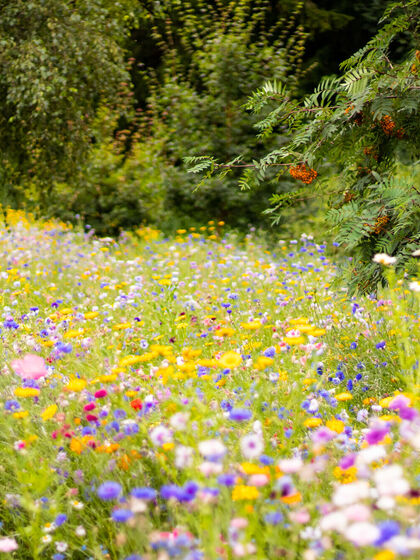
Guidance notes
Prepare to submit your Field Change Request with the support of these guidance notes.
Our guidance will help you assess the changes you are proposing to make to your green space. It will support you to understand if our consent is required and, if it is, what details and documents we need to see in your field change request application. Read all the sections relevant to your request and note the supporting documents you will be required to submit.
Changes that do not require our consent include:
- Any outdoor sport and recreational facilities provided that they are open to the public - these include facilities for organised games, and informal sport and recreation, such as play equipment, climbing walls, artificial pitches, MUGAs, tennis courts, bowling greens and skate parks
- Changing the mix of outdoor sport and recreational facilities including the addition of paths for cycling and/or walking
- Tree planting or tree removal, other planting and wildflower areas, benches
- Licences provided they do not give exclusive possession and are in line with the permitted use in the protection instrument
- Temporary compounds relating to improvement works within the protected space
The sections below help you to decide if any change not listed here needs our consent.
Please note that Fields in Trust will follow its own guidance and policies when making a request decision. Fields in Trust consent, when required, is necessary irrespective of any other legal requirements.
Key points for all applications:
The applicant
We would normally expect to see an application made by the Landowner. If you are the leaseholder or Managing Trustee of the site you can still submit a request but you will need to involve the Landowner at the outset and we will need to see evidence to that effect.
Charitable or non-charitable land
If the land is held charitably then the Charity regulator may need to be consulted about the need for their consent to your proposal. If the site is not held charitably there may be other legislation relating to a disposal that needs to be adhered to. It is your responsibility to check.
Third party agreements
If arrangements have been agreed between the applicant and other parties Fields in Trust is not obliged to automatically decide in favour of that agreement. Applicants are therefore encouraged to engage with Fields in Trust as early as possible to avoid disappointment.
Planning permission
Any consent granted by Fields in Trust concerning a proposal that requires planning permission is conditional upon you obtaining the necessary planning permission through the Local Planning Authority. We will require a copy of planning permission if it has already been obtained.
You can apply for planning permission before contacting Fields in Trust, or after obtaining our consent, or both applications can run concurrently. In certain cases, we may ask you to obtain planning permission before we assess your proposal.
Consultations
Please tell us about the outcomes of any consultation you have undertaken. Receiving objections does not necessarily mean we will withhold our consent; we are interested in how you have dealt with opposition to the proposal. If you submit an application before receiving the outcomes of a consultation, where one is planned, we can only give our preliminary views, with final approval to follow once we receive the results.
Detailed advice for changes requiring consent:
Car parks
All new and extended car parks require Fields in Trust approval. Please ensure that details of the size of the proposed car park and the number of proposed car parking spaces are included in the application form. If there is an existing car park within the green space, please state the number of existing car parking spaces. If the request is approved, it will likely be on condition that the car park is used solely by the users of the site. We would expect you to implement measures to ensure this use is complied with if necessary. If the car park will not be restricted to the users of the site, you will need to offer an alternative green space to be dedicated in accordance with our Disposal Policy.
Documents required for application:
- Clear plan of the protected space delineating the boundaries of any existing car park in one colour and proposed new car park in another colour. If possible, please also illustrate the proposals on an aerial or satellite map.
- Planning permission, if already granted.
Event or festival
Consent for an event or festival is required where more than 25% of the protected space will be closed for more than 21 consecutive days (including set up and set down). Relevant considerations are the extent of the green space required, duration of the event and its impact on the green space and its use. If any sport clubs and/or regular users will be affected, Fields in Trust would expect to see alternative provisions for these users for the duration of the event.
If the proposed event is approved by Fields in Trust, it will typically be subject to conditions including reinstatement of the affected green space and reinvestment of any profit in the recreational use of the green space.
Documents required for application:
- Clear plan of the protected space delineating the boundaries of the area required for the event or festival in colour. If possible, please also illustrate the proposals on an aerial or satellite map.
Fencing
Temporary and permanent fencing which does not restrict public access and is ancillary to the recreational use, as well as temporary fencing for maintenance reasons or for the duration of sports matches do not require our consent.
Permanent secure fencing which seeks to restrict access by keeping the gates locked does not require our consent provided that:
Usage by the public is via booking or through club membership for a reasonable charge in line with other similar facilities in the locality, and
The total footprint of all such facilities does not exceed 50% of the protected space.
If both of these provisions are not met, then our consent is required. Key considerations are the reasons for erecting a permanent fence, the general usage of the space and the proportion of the protected space that will be affected. The applicant will need to demonstrate that sufficient green space remains freely accessible for the needs of the local community.
Documents required for application:
- Clear plan of the protected space delineating the line of the proposed fencing. If possible, please also illustrate the proposals on an aerial or satellite map.
- Planning permission, if already granted.
New building, structure or extension
Fields in Trust’s consent is not required for buildings, structures and extensions as long as they directly support the sport and recreational use of the protected space and their total footprint does not exceed 20% of the protected space. These are:
- Sports pavilions
- Changing rooms
- Public toilets
- Storage facilities for sport and play equipment and machinery
- Cafes
Fields in Trust’s consent is required for erecting buildings or making extensions that:
Are not mentioned in the above list, or
If they are mentioned:
Will include any use that is inconsistent with the use of the space for outdoor sport and recreational purposes
The total footprint of all buildings and structures, including car parks, that directly support sport and recreational use is more than 20% of the protected space.
Please see our Policy on Building Uses for further information on building uses and considerations for field change requests of this nature. Click here for Policy Position on Building Uses
If the proposed use does not meet the requirements set out in the Policy Position on Building Uses it will be considered in accordance with our Disposal Policy, which means that replacement land would be expected to be put forward. Click here for Disposal Policy.
We require that during any construction work all reasonable precautions are taken to avoid obstruction to or interference with site users; and once completed the building/car park are kept in proper repair and condition.
Please ensure that your application is accompanied by the documents below and include details of proposed uses and users of the building.
Documents required for application:
- Clear plan of the protected space delineating the location and boundaries of the proposed building, structure or extension in colour. If possible, please also illustrate the proposals on an aerial or satellite map.
- Proposed floor plan.
- If the proposal is for a building extension, also a floor plan for the existing building.
- Planning permission, if already granted.
Change of use of an existing building or structure
Please see our Policy on Building Uses which sets out the relevant considerations and our requirements.
Please ensure that your application is accompanied by a location plan, proposed floor plan and existing floor plan (where applicable) and include details of existing uses and users of the building and proposed new uses and users.
Documents required for application:
- Clear plan of the protected space delineating the location and boundaries of the building. If possible, please also illustrate the proposals on an aerial or satellite map.
- Existing floor plan.
- Planning permission, if already granted.
Lease or sub-lease
In order to assess your proposal we require a copy of the Heads of Terms of the proposed Lease or a draft Lease which should include information on rent, permitted use, alterations, subleasing, assignment and security of tenure. When considering granting a lease, we advise due consideration is also given to alternative solutions which may be more cost effective, such as a licence or management agreement. Broadly we would expect to see the following provisions in the proposed Lease:
Permitted use is within the user clause of the Deed of Dedication, or is ancillary to that use or complements the permitted use.
A lease to a sports club should provide some access to the general public when not in use by the club. In addition, the sports club must have an open membership and the membership fees should not be prohibitive. A copy of the club’s constitution and evidence of reasonable membership fees are required.
The landlord must be willing to reinvest any financial gain in improvements to or maintenance of the remainder of the site.
The security of tenure provisions of the Landlord and Tenant Act 1954 must be excluded from the lease.
Absolute prohibition on alienation or alienation requires the Landlord’s consent.
Alterations to the premises is either prohibited or requires the Landlord’s consent.
If the site is held on charitable trust, evidence is required of compliance with the Charities Act 2011 (if available at the time of the request).
In England and Wales, the security of tenure provisions in the Landlord and Tenant Act 1954 means the leaseholder has the right to seek a new tenancy when the current one ends. However, where land is for community use it is not always appropriate for the method of management to stay the same, we therefore recommend that all leases have no provision for automatic renewal and the lease is contracted out of the security of tenure provisions. Please note that the equivalent legislation does not exist in Scotland and Northern Ireland.
Many organisations requesting a lease are non-corporate bodies. A corporate body is one that has perpetual succession and a legal identity distinct from that of its members; this includes local authorities of all types, companies limited by guarantee, companies with limited or unlimited liability, bodies created by statute and more recently charitable incorporated organisations. Where the proposed leaseholder is not a corporate body, the individuals who sign the lease acquire the obligations within the lease both collectively, and individually. In these cases, you will need to give further consideration in assessing the viability of the proposed leaseholder.
As the landowner you may charge a nominal rent, even if the proposed lease is on a charitable site. If nominal rent is to be charged on a charitable site in England and Wales, then we ask to see a copy of the report undertaken under the Charities (Qualified Surveyors’ Reports) Regulations 1992. If your application is approved it would likely be subject to a number of conditions being met including an undertaking that rent payments will be reinvested in the site and inclusion of certain provisions in the lease, such as any of the considerations listed above.
We usually require a Fields in Trust third party clause to be inserted in the lease and in some cases, for example where the lease covers the whole of the protected space or is a 99 year lease, a Deed of Dedication with the leaseholder will be required. A copy of the agreed lease complying with the conditional consent must be provided in order for us to issue a Land Registry certificate to enable the applicant to register the lease at the Land Registry.
Documents required for application:
- Clear plan of the protected space and a copy of the plan to be attached to the lease/sub-lease/assignment. If possible, please also illustrate the proposals on an aerial or satellite map.
- Copy of the proposed lease/sublease or agreed Heads of Terms.
Lease assignment
You will need to provide us with a copy of the existing Lease, a draft Transfer Deed and a copy of the assignee’s constitution. If the assignee is a sport club, they must have open membership rules and provide details about their membership fees.
Documents required for application:
- Clear plan of the protected space and a copy of the plan to be attached to the lease. If possible, please also illustrate the proposals on an aerial or satellite map.
- Copy of the proposed Deed of Assignment – Copy of the governing document for the proposed tenant, subtenant or assignee, if it is a sport club or a charity.
Licence giving exclusive use
Licences do not normally require Fields in Trust’s consent provided:
The permitted use in the Licence is within the user clause of the Deed of Dedication or ancillary to that use or complementary to the permitted use, and
The Licence does not give exclusive possession.
A Licence that gives exclusive possession to a sports club requires Fields in Trust’s consent and the lease considerations will be applicable. There should be some access to the general public when not in use by the club. In addition, the sports club must have an open membership and the membership fees should not be prohibitive. The application must be accompanied by a copy of the club’s constitution, draft Licence and associated plan showing the extent of the land to be included in the Licence edged or shaded in colour. We need to know what level of public access will be allowed and when. If any part of the site will not have free public access, you must specify which part and explain the reason for that.
Documents required for application:
- Clear plan of the protected space and a copy of the plan to be attached to the Licence. If possible, please also illustrate the proposals on an aerial or satellite map.
- Copy of proposed Licence.
Legal charge
Usually, such a request is linked to other developments on the site that may require Fields in Trust approval so please make sure that you complete all the relevant sections in the application form concerning the proposed development. If the proposed legal charge relates to Sport England funding, please make Sport England aware that the site is protected with Fields in Trust as they will replace their requirement with a Deed of Dedication. The user clause in Sport England's Deed of Dedication will have to align with the user clause in the existing Fields in Trust Deed of Dedication.
Documents required for application:
- Clear plans of the land to be subject to the legal charge. If possible, please also illustrate the proposals on an aerial or satellite map.
- Copy of the proposed Legal Charge, or loan agreement and terms and condition of grant.
Easements, servitudes, wayleaves and rights
Granting of an Easement or Servitude requires Fields in Trust consent. Granting of a Wayleave requires Fields in Trust consent only where the protection is charitable. The vast majority of easements, servitudes and wayleaves concern granting of rights to utility companies to allow them to install underground apparatus. It is an essential requirement that the grantee undertakes to reinstate the site following completion of works. The proposed route for the Easement, Servitude or Wayleave must not compromise the use of the green space for outdoor sport, recreation or play.
A standard condition attached to granting consent for such a proposal is that the landowner must reinvest any financial gain in improvements to or maintenance of the site. In relation to charitable sites, another condition would be compliance with the disposal provisions of the Charities Act 2011.
Fields in Trust’s consent is required for granting a lease of non-dedicated land where the lease gives easement rights to the tenant (ex. right of way, rights to connect to service media) over the dedicated space. The grant of those rights is caught by the Fields in Trust’s restriction and you need to provide a copy of the Lease including a plan so we can assess what the effect of the tenant’s rights would be on the use of the dedicated site.
Documents required for application:
- Copy of the plan to be attached to the Easement, Servitude or Wayleave (as applicable). If possible, please also illustrate the proposals on an aerial or satellite map.
- Copy of the proposed Deed of Easement/Servitude/Wayleave or agreed Heads of Terms.
Telecommunications apparatus and structures
The telecommunication operators benefit from various rights contained in the Telecommunication Code 2017; however each application will be considered on its own merits with particular regard to the physical characteristics of the site and its surroundings taking into account the Code rights. The proposed location of the structure must not interfere with the optimum layout and orientation of sports pitches or other play or recreational facilities on the site and the route of access for service vehicles to the apparatus must not cross the area of any sports pitch or any other play or recreational facility.
We recommend that the landowner obtains a valuation from a surveyor as to the rent/compensation for the grant of the Code rights. In the case of a recreation ground held on charitable trust or by a charity, this is a compulsory requirement of the Charities Act 2011.
The agreement with the telecom operator must always contain provisions requiring the operator to reinstate the site after the works have completed. The operator must indemnify the landowner and the site managers/occupiers against all claims that may arise from the presence of telecommunications apparatus on the site. The operator must observe the terms of the “Code of Best Practice on Mobile Phone Network Development” (version 2016 in England or 2021 in Wales (as applicable)), or such equivalent guidance as may vary or replace it. The apparatus and/or structures must be removed, as soon as reasonably practicable, after they are no longer required for telecommunication purposes.
In addition to Fields in Trust’s field change request fee the operator will have to pay a consent fee of £4000 (plus VAT) to meet Fields in Trust's charitable objectives.
Documents required for application:
- Clear plan of the protected space delineating the location and boundaries of the proposed structure in colour. If possible, please also illustrate the proposals on an aerial or satellite map.
- Copy of the proposed Lease or Easement (as applicable).
Transfer of protected land to another landowner
Relevant consideration is whether or not the intention is for the protection to continue after the transfer.
If the intention is for the protection to be terminated on the transfer of the site, the request will be considered in accordance with the Disposal Policy. The applicant is required to address how the proposed replacement land meets with the requirements of this policy. Fields in Trust will want to see evidence of consultations carried out with the local community, and the results of the consultations.
If the protection is to continue after the transfer, Fields in Trust's concerns are any strategic plans in terms of facility development and the ability of the proposed new landowner to maintain the green space. Normally consent to a transfer of land would be conditional on the proposed transferee entering into a Deed of Dedication with Fields in Trust.
Documents required for application:
- Clear plan of the protected space delineating the boundaries of the land to be transferred in colour. If possible, please also illustrate the proposals on an aerial or satellite map.
Change of Holding Trustee
Where the protected green space is registered in the name of individual Trustees and a Trustee is being replaced, or a new Trustee is being appointed, a Deed of Appointment and Retirement of Trustee or a Transfer Deed will be required for the change to take effect. In order to consider the proposal, we require a copy of the proposed Deed and our approval is given on condition that a Supplemental Deed is entered into with Fields in Trust to transfer the rights and obligations under the Deed of Dedication to the new Trustee.
Documents required for application:
- Copy of the proposed Deed of Appointment and Retirement of Trustee or TR1.
Change of use of land from recreational to non-recreational
Any change of use must be consistent with Fields in Trust's charitable objectives and it is likely that any other use will not be acceptable. Therefore the applicant may wish to put forward replacement land in accordance with our Disposal Policy.
The most common request for change of use relating to open green space is temporary use for a compound site to facilitate works within/outside the protected site. Key considerations are the extent of the area required, duration of the use, any compensation offered for the loss of recreational use and reinstatement obligations.
Documents required for application:
- Clear plan of the protected space delineating the boundaries of the area in respect of which the change of use is requested in colour. If possible, please also illustrate the proposals on an aerial or satellite map.
Release of land from Fields in Trust protection
An application should be submitted for release of the area in question where the landowner wishes to:
Transfer part of the protected space for use incompatible with the permitted use under the Deed of Dedication, or
Erect a building or building extension that does not support the recreational use and does not comply with the Policy on Building Uses.
Such requests will be considered in accordance with our Disposal Policy. The applicant is required to address how the proposed replacement land meets the requirements of this policy. In the majority of cases, Fields in Trust will want to see evidence of consultations carried out with the local community, and the results of the consultations.
Documents required for application:
- Clear plan of the protected space delineating the boundaries of the land required for release in colour.
- Clear plan of the proposed replacement land in colour.
- If possible, please also illustrate the proposals on an aerial or satellite map.
Climate change mitigation and biodiversity
In principle, Fields in Trust is supportive of changes and adaptations to a protected green space where the primary purpose is to avoid, adapt to or mitigate the actual or anticipated effects of climate change including working toward a carbon target of 'net zero’; and the creation of habitats that increase biodiversity including biodiversity net gain projects.
The following adaptations would be acceptable without our consent because they will benefit or enhance the quality of the protected green space itself, or the facilities that support the recreational use of that green space.
- Solar panels on facility rooves
- Flood and drainage management systems that do not require erection of structures
- Tree and wildflower planting, including orchards
- Hedge planting
- Habitat creation for biodiversity
If any of the proposed activities require temporary locked fencing to establish an area, please contact us in the first instance to check if our consent is required.
For some adaptations, our consent will be required and replacement land may also be required in accordance with our Disposal Policy. Proposals requiring our consent are predominantly related to structures and those adaptations that would benefit beyond the boundaries of the protected green space they are situated in, examples are:
- Turbines of any size or number not directly benefitting the protected space
- Solar panels on the ground or where solar power generated is are to be used beyond the protected space for wider climate change mitigation objectives
- Flood prevention requiring erection of structures
- Electric car charging points where the car parking area will be extended
Fields in Trust recognises that changes in technology, scientific opinion and methods for supporting nature and preventing extreme climate change are constantly evolving and improving, and we will update these lists and be open to discussion about new approaches with landowners as needed.
Further information
If you would like more information about the field change request process or have a query not answered in our guidance, please use our contact form, selecting field change request as the topic of your enquiry.
This guidance was last updated in September 2023



